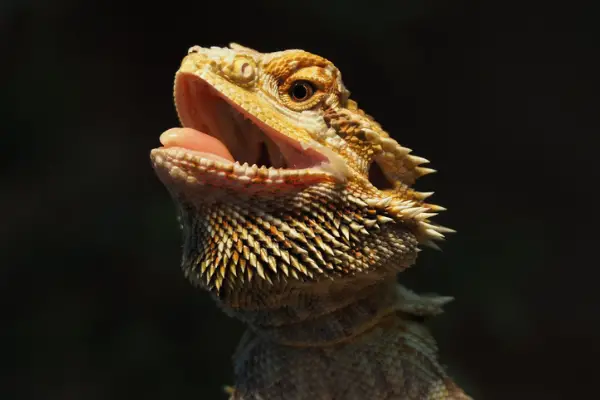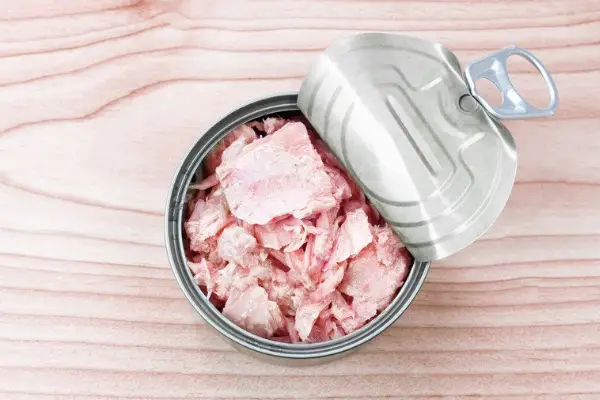Fish is an abundant and tasty natural resource that many humans and animals eat as a part of a healthy diet. You might be left wondering, therefore, whether or not bearded dragons eat fish? And, more specifically, can bearded dragons eat tuna?
Can bearded dragons eat tuna? The short and simple answer is yes, Bearded Dragons can eat tuna. In the wild there has been noted, rare occasions when Bearded dragons have been seen eating fish. However, for many reasons, feeding tuna to your bearded dragon is not recommended.
So, while fish might not harm your bearded dragon, it’s not typically part of their natural diet, and with all the other food they could eat, there is really no need to feed tuna to your bearded dragon. So let’s look in more detail at why it may not be a good idea to feed tuna to a bearded dragon. Can bearded dragons eat tuna?
Nutrition of tuna and fish
By nature, some fish are very fatty. Since they’re often full of Omega 3 and Omega 6 fatty acids, humans are encouraged to enjoy fish as a part of a healthy diet. The same goes for many domesticated animals, too, like cats and dogs.
However, this is not the case for bearded dragons. Fish and tuna contain high amounts of copper sulphate and could also contain parasites.
Of course, the dangers of copper sulphate and parasites are typically only present when you feed your bearded dragon in large quantities, but why risk it when there are plenty of other safe foods?
The problems with fish – parasites
Can bearded dragons eat tuna? Every reptile has its specific needs when it comes to feeding, and just because one reptile can eat fish, it doesn’t mean they all can. Even reptiles that can eat feeder fish can’t eat all fish. Goldfish, in particular, are bad as they contain thiaminase. This prevents the absorption of vitamin B and can cause death.
Tuna specifically can contain parasites like Anisakadie and Opisthorchiidae, which can make your bearded dragon sick. They can also contain Kudoa hexapunctata, which causes digestive problems.

The problems with fish – mercury
Arguably one of the most serious issues with feeding tuna to a bearded dragon is its high levels of mercury.
Mercury is a metal that is liquid at room temperature. You’ll often find it in older thermometers, automatic light switches and thermostats. It is also used in industry for power plants, the manufacture of certain chemicals, and cement plants.
Mercury ends up in the food chain when it is released into the environment and settles in our waterways and oceans. Natural bacteria will absorb the mercury and are eaten by small fish, which larger fish like tuna then eat. At every step of the food chain, the mercury builds up. It never dissolves or breaks down. This means that very large fish like tuna can have 10,000 times the amount of mercury in their systems than their surrounding habitat.
Exposure to mercury can cause many health problems in humans. And while the effects in bearded dragons aren’t known, they will surely be similar.
Additionally, feeding a reptile too much fish can deplete their levels of vitamin B3 (niacin).
So, as well as tuna, you should avoid feeding your bearded dragon any seafood like prawns, shrimp and crab too.
So what does a good bearded dragon diet look like?
Bearded dragons are omnivorous. They should eat a diet of vegetables and live food in addition to a quality specialist food. For the live food, locusts, crickets and dubia roaches are recommended. Many bearded dragon owners like to stay away from super worms or mealworms because they’re high in fat, but they can be given as a treat. Bearded dragons can gain weight easily if you do feed them mealworms or super worms.
As a general rule, any dark green, leafy vegetable is fine for your pet beardie. Thinks to avoid include nutrient-poor vegetables like celery or iceberg lettuce as these are mainly water and fibre. Their diet should be half plant material and half animal-based. Within the plant material could be as much as 20% fruit. You can also give them flowers as a treat. Dandelions, carnations, geraniums, roses, nasturtiums and hibiscus are all delicious treats.
In terms of animal protein, gut-loaded grasshoppers are great, as are calcium-dusted spiders, wax worms, slugs and earthworms. When you see the word ‘dusted’, this simply means that the insect is coated in a powder containing multiple vitamins and calcium. It’s a great way to get these nutrients into your bearded dragon. Alternatively, gut loading means that the insects have been force-fed a diet that is packed with nutrients, including calcium, so that their gastrointestinal tract is full.
In the wild, of course, gut-loading and dusting don’t happen. This doesn’t mean that bearded dragons miss out on vital nutrients – quite the opposite. Commercially-bred insects aren’t as nutritious because of the way they’re bred to grow and reproduce quickly. Gut loading and dusting happens to make them as nutritious as they would be in the bearded dragon’s natural habitat.
If you would like to read about the perfect diet for a Bearded Dragon, please check out the article that I wrote. You can give them a great mix food which you can buy here.
Final thoughts – can bearded dragons eat tuna?
Can bearded dragons eat tuna? The truth is not much research has been done on feeding fish to bearded dragons. With all of the things that could go wrong, it’s not worth the risk. The parasites, the mercury content etc., are risks that you just wouldn’t want to take with a beloved pet. Bearded dragons can enjoy so many safe foods, so you don’t need to feed them fish.
Think about it, a bearded dragon would never eat tuna naturally, so why take the risk and provide him something that he wouldn’t normally eat? If you’re here because your bearded dragon accidentally ate some tuna for some reason, don’t be unduly concerned. The chances are he will be completely fine – just make sure they don’t eat it again.
So to summarise, while you could feed your bearded dragon tuna, it’s really not advisable. Tuna contains high levels of mercury, which could cause harm. Tinned tuna will also contain additives and brine or salt that aren’t good for your pet too.
